|
|
|
Sort Order |
|
|
|
Items / Page
|
|
|
|
|
|
|
| Srl | Item |
| 1 |
ID:
137318
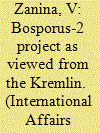

|
|
|
|
|
| Summary/Abstract |
BOSPORUS' TRAFFIC will be reduced to zero," Prime Minister Recep Tayyip Erdogan of Turkey stated in April 2011 as he spoke to a thousands-strong Turkish audience, suggesting as an alternative to the current Bosporus a new "grandiose project," the Bosporus-2 (the official name being Kanal Istanbul).1 Raised in the run-up to the parliamentary elections, the question of the construction of the channel immediately after the victory of the ruling Justice and Development Party (AKP) risked being forgotten. However, from statements of the Turkish government ahead of the presidential election in August this year it became clear that work on the project continues and practical steps are already underway for its implementation.2 With some skepticism, however, Erdogan's plan upset the Turkish and world community over the issue of the legal status of the new strait and unnecessary fuss around the Straits of Bosporus and the Dardanelles.
|
|
|
|
|
|
|
|
|
|
|
|
|
|
|
|
| 2 |
ID:
137306
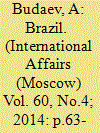

|
|
|
|
|
| Summary/Abstract |
RECENTLY, soft power as an important factor of international relations and interstate communication has come to the fore in international and Russian political discourse. At the turn of the 1990s, well-known American political scientist and neoliberal Joseph Nye, Jr. offered his now famous and widely used formula: "What is soft power? It is the ability to get what you want through attraction rather than coercion or payments"1 and specified: "The ability to affect what other countries want tends to be associated with intangible power resources such as culture, ideology and institutions."2 Later, the formula was extended to include attractive domestic policies, economic achievements and even the (American) life style and (American) values.
|
|
|
|
|
|
|
|
|
|
|
|
|
|
|
|
| 3 |
ID:
137311
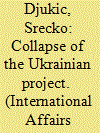

|
|
|
|
|
| Summary/Abstract |
THE SLAVIC PEOPLES are living through another severe conflict, but history never stops. The so-called Ukrainian project - a dream about Ukraine as a Western toehold (we all know whose) born as soon as the Soviet Union fell apart - is moving toward its defeat. The Ukrainian drama is rapidly approaching its culmination; the very ambiguous presidential elections of May 25 will draw a line beyond which the country will either fall apart or power will start talking to people to preserve an asymmetric Ukrainian confederation, that is, another "Ukrainian project.
|
|
|
|
|
|
|
|
|
|
|
|
|
|
|
|
| 4 |
ID:
137303
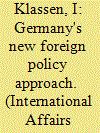

|
|
|
|
|
| Summary/Abstract |
THE 50TH MUNICH SECURITY CONFERENCE heard vague hints from the new governing coalition about a significant evolutionary change in Federal Germany's foreign policy strategy. Germany's Foreign Minister Frank-Walter Steinmeier said that his country "must be ready for earlier, more decisive and more substantive engagement in the foreign and security policy sphere.
|
|
|
|
|
|
|
|
|
|
|
|
|
|
|
|
| 5 |
ID:
137314
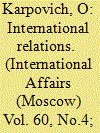

|
|
|
|
|
| Summary/Abstract |
TODAY, the world is living amid global changes in which political realities "are shaped, to an increasing degree, by global political instability, a product of erosion of the Westphalian system and increasingly chaotic international relations. They provide the background against which a new multipolar world order is being shaped."1 The system of international relations is gradually slipping toward anarchy2 amid the mounting crisis of the idea of a "democratic world," the pivotal concept of the unipolar world.
|
|
|
|
|
|
|
|
|
|
|
|
|
|
|
|
| 6 |
ID:
137321


|
|
|
|
|
| Summary/Abstract |
IRELAND is a young country, only achieving independence in 1922. However, it is the home of an ancient culture.
The theme of my address gives me a wide scope. Contemporary can of course refer to any person who is still living today. I have a ninety-eight-year old aunt who was born in 1916 and is still driving her car. In the case or Ireland, of course, it is impossible to understand the contemporary scene without understanding the deeper history.
|
|
|
|
|
|
|
|
|
|
|
|
|
|
|
|
| 7 |
ID:
137298
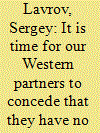

|
|
|
|
|
| Summary/Abstract |
I am pleased to welcome the participants in the First Forum of Young Diplomats from the CIS countries, Abkhazia and South Ossetia. I am confident that we will have an interesting discussion and I hope that you will enrich your knowledge at its close as a result of the exchange of views, plans and ideas. Such meetings will be scheduled on a regular basis and will be a useful venue for young professionals to discuss topical issues of international life and the regional agenda.This is important because you are our hope and our successors.
|
|
|
|
|
|
|
|
|
|
|
|
|
|
|
|
| 8 |
ID:
137320
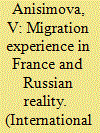

|
|
|
|
|
| Summary/Abstract |
ONCE THE USSR COLLAPSED, the Russian Federation and other former Soviet states had to adapt to the processes of globalization and harsh competition in the international arena. On the one hand, this opened up fresh development opportunities; on the other hand, this inevitably presented fresh challenges and exposed the weaknesses and maladies of the yet immature sociopolitical and economic systems. The previous single economic structure, which made it possible to smooth over the uneven distribution of resources and use them for a harmonious development of all territories of the former Soviet Union, was disrupted in order to indulge the political interests while disregarding the economic links that had taken decades to form. It is this factor coupled with demographic problems that was behind the swelling streams of migrants in the former Soviet Union.
|
|
|
|
|
|
|
|
|
|
|
|
|
|
|
|
| 9 |
ID:
137309


|
|
|
|
|
| Summary/Abstract |
THE UKRAINIAN CRISIS has forced NATO not only to readjust its plans but also its aims. Time is short: corresponding documents should be ready by the Wales Summit scheduled for September 4-5, 2014 which "will shape the future of our Alliance."1 According to Anders Fogh Rasmussen, the Alliance's Secretary General, "later this year, in Wales.... we need to take tough decisions in view of the long-term strategic impact of Russia's aggression on our own security."2 Alexander Vershbow, NATO's second-in-command, followed suite: "Moscow's role in the ongoing crisis in Ukraine has forced NATO to reconsider the alliance's opinion on Russia" and, probably, to revise its strategy.
|
|
|
|
|
|
|
|
|
|
|
|
|
|
|
|
| 10 |
ID:
137317


|
|
|
|
|
| Summary/Abstract |
DESPITE SIGNIFICANT EFFORTS by the world community, the problems of new challenges continue to define the agenda of today's international security, and the key non-state threat - international terrorist activities - remains a primary concern for all major countries and international organizations.
|
|
|
|
|
|
|
|
|
|
|
|
|
|
|
|
| 11 |
ID:
137304
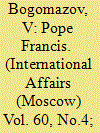

|
|
|
|
|
| Summary/Abstract |
A YEAR AGO, on March 13, 2013, Archbishop of Buenos Aires Cardinal Jorge Mario Bergoglio was elected head of the Roman Catholic Church (RCC) and, therefore, head of the Vatican city-state (officially the Holy See) as Pope Francis. These twelve months were brimming with comments on what had been done and what was expected from the new Pope. The wide range of views and opinions coming from Russia, the U.S., Western Europe, and Latin America stretch from pragmatic and realistic to extremist and radical.
|
|
|
|
|
|
|
|
|
|
|
|
|
|
|
|
| 12 |
ID:
137316
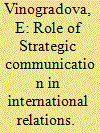

|
|
|
|
|
| Summary/Abstract |
GLOBALIZATION stands out as a major trend in today's world.* Its technological basis is the penetration of information technology into every aspect of social activity; integrating the information systems of different countries into a unified worldwide information sphere; the establishment of a common information space; the creation of global information and communication networks, and the intensive adoption of new information technologies in all areas of human activity.
|
|
|
|
|
|
|
|
|
|
|
|
|
|
|
|
| 13 |
ID:
137319
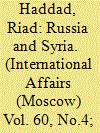

|
|
|
|
|
| Summary/Abstract |
International Affairs: Mr. Ambassador, what is the status of the crisis settlement process in Syria?
Riad Haddad: The Syrian leadership has been calling for a political settlement of the crisis through a comprehensive national dialogue with the participation of all representatives of Syrian society. We are continuing to work in this direction. It may be recalled that in 2013 President Bashar Assad put forward a plan to settle the Syrian crisis and make a transition to a new Syria without outside interference.
We proclaimed the same approach at the Geneva Conference, and the Syrian delegation, the only representative of the Syrian people, was sincere and serious in the course of the negotiations. At the same time, the presentation by Secretary of State John Kerry at the opening of the Geneva-2 Conference was provocative and destabilizing. In response to that, Syrian Foreign Minister Walid Muallem stated that no one has the right to decide the fate of the Syrian people except the Syrians themselves, reminding Kerry and his allies about the UN Charter and the principles of international law prohibiting interference in the affairs of independent states.
|
|
|
|
|
|
|
|
|
|
|
|
|
|
|
|
| 14 |
ID:
137312


|
|
|
|
|
| Summary/Abstract |
TWENTY YEARS AGO, on June 24, 1994, on the Greek island of Kerkyra, also known as Corfu, the Russia-EU Partnership and Cooperation Agreement (PCA) was signed. It entered into force three years later, on December 1, 1997, and is in effect to date. It can be said without exaggeration that at the turn of the century this breakthrough laid down a stable legal foundation for the comprehensive development of the Russia-EU dialogue in various spheres.
|
|
|
|
|
|
|
|
|
|
|
|
|
|
|
|
| 15 |
ID:
137313
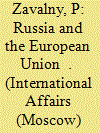

|
|
|
|
|
| Summary/Abstract |
International Affairs: Pavel Nikolayevich, your report opened the 9th Annual International Conference "Russia-EU Energy Dialogue: Gas Aspect. " How did the worsening of relations between Russia and Europe over the situation in Ukraine affect the conference?
P. Zavalny: The "Russia-EU Energy Dialogue: Gas Aspect" conference is a joint event held for many years by the Russian Gas Society and the European gas industry association Eurogas with the participation of the European Commission's Directorate-General for Energy. At first, the conference met in Berlin, but in the past three years it has met in Brussels, the decision-making center in the area of EU energy policy. As a rule, all our conferences were rich in content, with concrete and sometimes heated debates, and were always attended by high-ranking officials from both sides, parliamentarians, top managers of major energy companies, experts, and researchers.
|
|
|
|
|
|
|
|
|
|
|
|
|
|
|
|
| 16 |
ID:
137307


|
|
|
|
|
| Summary/Abstract |
International Affairs: Yuri Alexeevich, for many years you have been professionally studying the history of Russia, including its ethno-political aspect. Is it possible to speak about Ukrainian citizens living on the territory of modern Ukraine as a single ethnos?
Yu. Bulatov: It is more correct to speak not about the Ukrainian people but the people of Ukraine. Why? Because the people of Ukraine is multiethnic: Ukrainians, Russians, Rusins, Poles, Tatars, Jews, etc. So it would not be quite correct to speak about Ukrainian citizens as a single Ukrainian ethnos.
|
|
|
|
|
|
|
|
|
|
|
|
|
|
|
|
| 17 |
ID:
137300
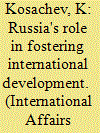

|
|
|
|
|
| Summary/Abstract |
FOSTERING INTERNATIONAL development, official facilitation of development, assistance to developing countries - these are closely related notions each of which is already recognizable in Russia, being actively discussed within the expert community but not always understandable to our country's citizens. This is why I consider it important to promote a broad public discussion about the way these processes generally evolve in the present-day world and what they mean for Russia as a world power with global interests and its own agenda for international relations.
|
|
|
|
|
|
|
|
|
|
|
|
|
|
|
|
| 18 |
ID:
137308
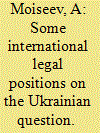

|
|
|
|
|
| Summary/Abstract |
MARCH 18, 2014 saw the signing of an international agreement between the Russian Federation and the Republic of Crimea on admission of the Republic of Crimea to the RF and on creation of new subjects within the Russian Federation. Under the agreement, applicable from the date of signature and in force since its ratification on March 21, 2014, Crimea is considered admitted to the Russian Federation, within which new subjects, the Republic of Crimea and the federal city of Sevastopol, are created. Persons residing as of that date on the territory of the new subjects of the Federation are recognized as Russian citizens but are entitled within a month to declare their wish to retain the citizenship they have. The legislative acts of the Russian Federation are already in operation in Crimea. Crimea's land border with Ukraine is declared a border of the Russian Federation; and the maritime areas in the Black and Azov seas are subject to delimitation based on the principles of international law.
|
|
|
|
|
|
|
|
|
|
|
|
|
|
|
|
| 19 |
ID:
137305
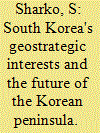

|
|
|
|
|
| Summary/Abstract |
THE GOVERNMENT of South Korea, led by new President Park Geun-hye, is critically rethinking the practice of securing the vital interests of their state in the geopolitical and geo-economic space of the Korean Peninsula. Today, when shaping a new system of global governance is the talk of the day, the responsibility of the Republic of Korea, as of any state, for the events occurring in the East Asia region and the world at large increases.
|
|
|
|
|
|
|
|
|
|
|
|
|
|
|
|
| 20 |
ID:
137315
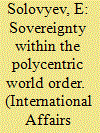

|
|
|
|
|
| Summary/Abstract |
THROUGHOUT the last three decades, the system of international relations has changed beyond recognition. Classical bipolarity has become a fact of history while the world has become aware of paradoxes of globalization and transformation of world politics. On the one hand, the human community has become an indivisible and interconnected whole. Globalization suggests cooperation in the face of common problems; adoption of common norms and rules of conduct in world politics; improvement of the old and creation of new efficient international institutions. On the other hand, globalization, responsible for the uneven development pace and emergence of a vanguard group of states and transnational forces (including the TNCs) which enjoys all the advantages offered by globalization, exacerbates a wide range of problems and causes grave economic and political crises and social upheavals.
|
|
|
|
|
|
|
|
|
|
|
|
|
|
|
|
|
|
|
|
|